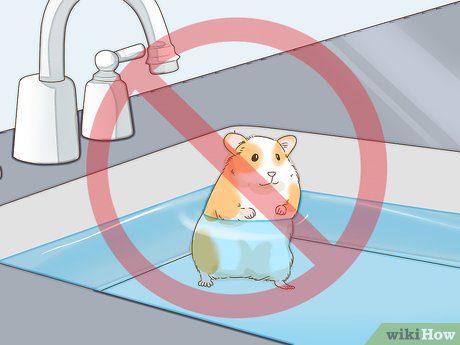
Do hamsters need to be bathed?
How do hamsters feel about water and do they swim in nature? What to do if the rodent’s coat gets dirty? How does bathing affect the health of a hamster? We talk about this in our article.
Hamsters are steppe animals, and they rarely meet “big water” on their way, but when they meet, they diligently bypass it. Every self-respecting hamster prefers to wait out the rain in a warm mink, and therefore the contacts of these animals with water are minimal. How do hamsters keep their fur clean?
Firstly, by their nature, rodents are very clean: they regularly and very diligently clean their fur coat. Secondly, in nature, rodents still bathe. That’s just not in the water, but in the sand, which helps to remove dirt and grease.
Of course, comparing the lifestyle of a wild and decorative hamster is not entirely correct. However, following the natural qualities of rodents, it is strongly not recommended to bathe them unless absolutely necessary. The best thing you can do to maintain your pet’s hygiene is to keep his home clean and, in general, to deprive the hamster of the opportunity to get dirty in something. Everything else he can do just fine!
If dirt does appear on the hamster’s fur, it is best to remove them locally, using a damp sponge (rag). Alternatively, you can prepare a bath for him with special purified sand for rodents, sold in pet stores. Just put a sand bath in a cage – and the hamster will happily lie in it. The coat after such a procedure will become much cleaner. However, you should not overdo it with bath days. Frequent bathing in the sand will lead to dry skin and a deterioration in the quality of the coat.
But what if the hamster gets dirty in something sticky and it is impossible to remove the dirt using the methods described above? Should you bathe your hamster? In this case, it is still possible to bathe the hamster in water, but only very carefully. Pour some water (optimal temperature 30°C) into a small bowl and place your hamster in it. The water level is about the chest of a rodent. Make sure that it does not get into the eyes, mouth and ears of the animal. It is better not to wet your head at all.
For bathing, it is recommended to use special shampoos for rodents. Human remedies are not suitable for animals and are highly likely to lead to an allergic reaction.
After washing, the hamster’s fur should be thoroughly dried with a towel. Make sure that there are no drafts in the room where the hamster will dry. Otherwise, a sensitive rodent, not accustomed to water procedures, will quickly catch a cold.
And do not forget that a responsible and caring owner simply does not create conditions in which the rodent can get very dirty. Take care of your pets!





